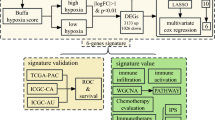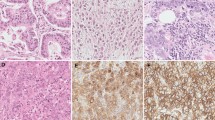Abstract
CA19-9 is the most specific biomarker for pancreas cancer. We investigated the prognostic significance of normal (≤37 U/mL) versus elevated (>37 U/mL) CA19-9 levels in patients with resected and advanced pancreas cancer. Relevant data were obtained from patients treated for early-stage or advanced pancreatic adenocarcinoma at our institution. Log-rank tests were used to evaluate relationship between CA19-9 and clinical outcomes of interest for both early- and advanced-stage patients. A total of 123 patients were included (Group A: N = 30 stage I/II; Group B: N = 93 stage III/IV). In group A, elevated preoperative CA19-9 was significantly associated with lymph node involvement (p = 0.031), tumor ≥3 cm (p = 0.011), and lack of tumor differentiation (p = 0.048). Failure of postoperative CA19-9 to normalize predicted significantly worse DFS (p = 0.021). For group B, elevated baseline CA19-9 was associated with shorter OS on chemotherapy (p = 0.0008) and decline in CA19-9 >25 % with treatment was a significant predictor of improved OS (p = 0.0099). Higher than normal CA19-9 level is an adverse prognostic factor in both early and advanced settings and may prove to be useful in the selection of patients for more aggressive therapy in future trials. CA19-9 level decrease of >25 % predicts improved survival in advanced disease on chemotherapy.


Similar content being viewed by others
References
Jemal A, Siegel R, Xu J, Ward E. Cancer statistics, 2010. CA Cancer J Clin. 2010;60:277-300. Published on 20100707. doi:10.3322/caac.20073.
Oettle H, Post S, Neuhaus P, et al. Adjuvant chemotherapy with gemcitabine vs observation in patients undergoing curative-intent resection of pancreatic cancer: a randomized controlled trial. JAMA. 2007;297:267–77. doi:10.1001/jama.297.3.267.
Regine WF, Winter KA, Abrams RA, et al. Fluorouracil vs gemcitabine chemotherapy before and after fluorouracil-based chemoradiation following resection of pancreatic adenocarcinoma: a randomized controlled trial. JAMA. 2008;299:1019–26. doi:10.1001/jama.299.9.1019.
Neoptolemos JP, Stocken DD, Bassi C, et al. Adjuvant chemotherapy with fluorouracil plus folinic acid vs gemcitabine following pancreatic cancer resection: a randomized controlled trial. JAMA. 2010;304:1073–81. doi:10.1001/jama.2010.1275.
Colucci G, Giuliani F, Gebbia V, et al. Gemcitabine alone or with cisplatin for the treatment of patients with locally advanced and/or metastatic pancreatic carcinoma: a prospective, randomized phase III study of the Gruppo Oncologia dell’Italia Meridionale. Cancer. 2002;94:902–10.
Colucci G, Labianca R, Di Costanzo F et al. Randomized phase III trial of gemcitabine plus cisplatin compared with single-agent gemcitabine as first-line treatment of patients with advanced pancreatic cancer: the GIP-1 study. J Clin Oncol. 2010;28:1645–51. Published on 20100301. doi:10.1200/JCO.2009.25.4433.
Cunningham D, Chau I, Stocken DD et al. Phase III randomized comparison of gemcitabine versus gemcitabine plus capecitabine in patients with advanced pancreatic cancer. J Clin Oncol. 2009;27: 5513–8. Published on 20091026. doi:10.1200/JCO.2009.24.2446.
Heinemann V, Quietzsch D, Gieseler F, et al. Randomized phase III trial of gemcitabine plus cisplatin compared with gemcitabine alone in advanced pancreatic cancer. J Clin Oncol. 2006;24:3946–52. doi:10.1200/JCO.2005.05.1490.
Herrmann R, Bodoky G, Ruhstaller T, et al. Gemcitabine plus capecitabine compared with gemcitabine alone in advanced pancreatic cancer: a randomized, multicenter, phase III trial of the Swiss Group for Clinical Cancer Research and the Central European Cooperative Oncology Group. J Clin Oncol. 2007;25:2212–7. doi:10.1200/JCO.2006.09.0886.
Louvet C, Labianca R, Hammel P, et al. Gemcitabine in combination with oxaliplatin compared with gemcitabine alone in locally advanced or metastatic pancreatic cancer: results of a GERCOR and GISCAD phase III trial. J Clin Oncol. 2005;23:3509–16. doi:10.1200/JCO.2005.06.023.
Muller MW, Friess H, Koninger J, et al. Factors influencing survival after bypass procedures in patients with advanced pancreatic adenocarcinomas. Am J Surg. 2008;195:221–8. doi:10.1016/j.amjsurg.2007.02.026.
Oettle H, Richards D, Ramanathan RK et al. A phase III trial of pemetrexed plus gemcitabine versus gemcitabine in patients with unresectable or metastatic pancreatic cancer. Ann Oncol. 2005;16:1639–45. Published on 20050808. doi:10.1093/annonc/mdi309.
Poplin E, Feng Y, Berlin J et al. Phase III, randomized study of gemcitabine and oxaliplatin versus gemcitabine (fixed-dose rate infusion) compared with gemcitabine (30-minute infusion) in patients with pancreatic carcinoma E6201: a trial of the Eastern Cooperative Oncology Group. J Clin Oncol. 2009;27:3778–85. Published on 20090706. doi:10.1200/JCO.2008.20.9007.
Koprowski H, Herlyn M, Steplewski Z, Sears HF. Specific antigen in serum of patients with colon carcinoma. Science. 1981;212:53–5.
Steinberg W. The clinical utility of the CA19-9 tumor-associated antigen. Am J Gastroenterol. 1990;85:350–5.
Tempero MA, Uchida E, Takasaki H, et al. Relationship of carbohydrate antigen 19-9 and Lewis antigens in pancreatic cancer. Cancer Res. 1987;47:5501–3.
Ferrone CR, Finkelstein DM, Thayer SP, et al. Perioperative CA19-9 levels can predict stage and survival in patients with resectable pancreatic adenocarcinoma. J Clin Oncol. 2006;24:2897–902. doi:10.1200/JCO.2005.05.3934.
Glenn J, Steinberg WM, Kurtzman SH, et al. Evaluation of the utility of a radioimmunoassay for serum CA19-9 levels in patients before and after treatment of carcinoma of the pancreas. J Clin Oncol. 1988;6:462–8.
Satoi S, Yanagimoto H, Toyokawa H, et al. Selective use of staging laparoscopy based on carbohydrate antigen 19-9 level and tumor size in patients with radiographically defined potentially or borderline resectable pancreatic cancer. Pancreas. 2011;40:426–32. doi:10.1097/MPA.0b013e3182056b1c.
Zhang S, Wang YM, Sun CD, et al. Clinical value of serum CA19-9 levels in evaluating resectability of pancreatic carcinoma. World J Gastroenterol. 2008;14:3750–3.
Waraya M, Yamashita K, Katagiri H et al. Preoperative serum CA19-9 and dissected peripancreatic tissue margin as determiners of long-term survival in pancreatic cancer. Ann Surg Oncol. 2009;16:1231–40. Published on 20090305. doi:10.1245/s10434-009-0415-7.
Berger AC, Meszoely IM, Ross EA et al. Undetectable preoperative levels of serum CA19-9 correlate with improved survival for patients with resectable pancreatic adenocarcinoma. Ann Surg Oncol. 2004;11:644–49. Published on 20040614. doi:10.1245/ASO.2004.11.025.
Sperti C, Pasquali C, Catalini S, et al. CA19-9 as a prognostic index after resection for pancreatic cancer. J Surg Oncol. 1993;52:137–41.
Smith RA, Bosonnet L, Ghaneh P et al. Preoperative CA19-9 levels and lymph node ratio are independent predictors of survival in patients with resected pancreatic ductal adenocarcinoma. Dig Surg. 2008;25:226–32. Published on 20080624. doi:10.1159/000140961.
Lundin J, Roberts PJ, Kuusela P, Haglund C. The prognostic value of preoperative serum levels of CA19-9 and CEA in patients with pancreatic cancer. Br J Cancer. 1994;69:515–9.
Motoi F, Rikiyama T, Katayose Y et al. Retrospective evaluation of the influence of postoperative tumor marker status on survival and patterns of recurrence after surgery for pancreatic cancer based on RECIST guidelines. Ann Surg Oncol. 2011;18:371–9. Published on 20100915. doi:10.1245/s10434-010-1311-x.
Berger AC, Garcia Jr M, Hoffman JP et al. Postresection CA19-9 predicts overall survival in patients with pancreatic cancer treated with adjuvant chemoradiation: a prospective validation by RTOG 9704. J Clin Oncol. 2008;26:5918–22. Published on 20081124. doi:10.1200/JCO.2008.18.6288.
Hata S, Sakamoto Y, Yamamoto Y et al. Prognostic impact of postoperative serum CA19-9 levels in patients with resectable pancreatic cancer. Ann Surg Oncol. 2011. Published on 20110824. doi:10.1245/s10434-011-2020-9.
Kondo N, Murakami Y, Uemura K et al. Prognostic impact of perioperative serum CA19-9 levels in patients with resectable pancreatic cancer. Ann Surg Oncol. 2010;17:2321–9. Published on 20100325. doi:10.1245/s10434-010-1033-0.
Yoo T, Lee WJ, Woo SM et al. Pretreatment carbohydrate antigen 19-9 level indicates tumor response, early distant metastasis, overall survival, and therapeutic selection in localized and unresectable pancreatic cancer. Int J Radiat Oncol Biol Phys. 2011;81:e623–30. Published on 20110519. doi:10.1016/j.ijrobp.2011.02.063.
Micke O, Bruns F, Kurowski R, et al. Predictive value of carbohydrate antigen 19-9 in pancreatic cancer treated with radiochemotherapy. Int J Radiat Oncol Biol Phys. 2003;57:90–7.
Ziske C, Schlie C, Gorschluter M et al. Prognostic value of CA19-9 levels in patients with inoperable adenocarcinoma of the pancreas treated with gemcitabine. Br J Cancer. 2003;89:1413–7. doi:10.1038/sj.bjc.6601263.
Ko AH, Hwang J, Venook AP et al. Serum CA19-9 response as a surrogate for clinical outcome in patients receiving fixed-dose rate gemcitabine for advanced pancreatic cancer. Br J Cancer. 2005;93:195–9. doi:10.1038/sj.bjc.6602687.
Wong D, Ko AH, Hwang J, et al. Serum CA19-9 decline compared to radiographic response as a surrogate for clinical outcomes in patients with metastatic pancreatic cancer receiving chemotherapy. Pancreas. 2008;37:269–74. doi:10.1097/MPA.0b013e31816d8185.
Halm U, Schumann T, Schiefke I, et al. Decrease of CA19-9 during chemotherapy with gemcitabine predicts survival time in patients with advanced pancreatic cancer. Br J Cancer. 2000;82:1013–6. doi:10.1054/bjoc.1999.1035.
Hammad N, Heilbrun LK, Philip PA, et al. CA19-9 as a predictor of tumor response and survival in patients with advanced pancreatic cancer treated with gemcitabine based chemotherapy. Asia Pac J Clin Oncol. 2010;6:98–105. doi:10.1111/j.1743-7563.2010.01290.x.
Rothenberg ML, Abbruzzese JL, Moore M, et al. A rationale for expanding the endpoints for clinical trials in advanced pancreatic carcinoma. Cancer. 1996;78:627–32. doi:10.1002/(SICI)1097-0142(19960801)
Eisenhauer EA, Therasse P, Bogaerts J, et al. New response evaluation criteria in solid tumours: revised RECIST guideline (version 1.1). Eur J Cancer. 2009;45:228–47. doi:10.1016/j.ejca.2008.10.026.
You DD, Lee HG, Heo JS et al. Prognostic factors and adjuvant chemoradiation therapy after pancreaticoduodenectomy for pancreatic adenocarcinoma. J Gastrointest Surg. 2009;13:1699–706. Published on 20090707. doi:10.1007/s11605-009-0969-5.
Benassai G, Mastrorilli M, Quarto G, et al. Factors influencing survival after resection for ductal adenocarcinoma of the head of the pancreas. J Surg Oncol. 2000;73:212–8.
Montgomery RC, Hoffman JP, Riley LB, et al. Prediction of recurrence and survival by post-resection CA19-9 values in patients with adenocarcinoma of the pancreas. Ann Surg Oncol. 1997;4:551–6.
Conflict of interest
None.
Author information
Authors and Affiliations
Corresponding author
Rights and permissions
About this article
Cite this article
Martin, L.K., Wei, L., Trolli, E. et al. Elevated baseline CA19-9 levels correlate with adverse prognosis in patients with early- or advanced-stage pancreas cancer. Med Oncol 29, 3101–3107 (2012). https://doi.org/10.1007/s12032-012-0278-9
Received:
Accepted:
Published:
Issue Date:
DOI: https://doi.org/10.1007/s12032-012-0278-9




